I don’t love Taxi Driver. Maybe every ten years or so I watch it again, and every time I’m left adrift as to just what it’s about or what it’s trying to say. I’m also blown away by the filmmaking. Every frame screams ‘70s, yet it looks and feels unlike anything else of its era. And however vague its meaning, what’s undeniable is its passion. Maybe its vagueness is a strength. It feels like it’s channeling all of the rage and frustration of the era into a single character. It seethes with anger, anger at what the world’s become, anger at the feeling of helplessness in the face of it, at the inability of any one of us to change anything about it, to save anyone, to save ourselves. Schrader and Scorsese are channeling something here, something powerful and gripping, no doubt something fueled by Catholic guilt and repression, and who knows what else besides. It feels like a movie that had to exist when it did, like someone had to say whatever it’s saying, and this was where it was said.
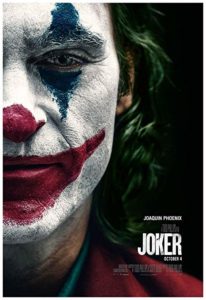
I have no idea what Joker is saying or why it exists. I know it wishes it were Taxi Driver and The King of Comedy rolled into one. It know it wants to replicate that feeling of helplessness and Travis Bickle’s righteous rage in the face of it. This much is obvious. But to what purpose? To tell the story of a comic book villain? To tap into the seething rage of our times? To make a few bucks?
The conceit, at first blush, sounds reasonable. What if the Joker, Batman’s arch nemesis, architect of chaos for the sake of chaos, were a real human being in the real present world? Feels like what Christopher Nolan did with his Batman trilogy (it isn’t). Feels like the kind of really real “reality” people are into these days. So why not get a genuinuely freaky deep actor to embody this guy and see what happens?
The problem comes not from the actor, Joaquin Phoenix, who as disturbed mama’s boy Arthur Fleck is, as ever, excellent. The problem is that the Joker, the film’s ostensible subject, is a comic book character. He’s not a real guy. If he were a real guy in the real world, he wouldn’t be a criminal mastermind. He wouldn’t be the Joker. He’d just be some guy. If you strip everything comic book related away from him, what are you left with? What story are you telling?
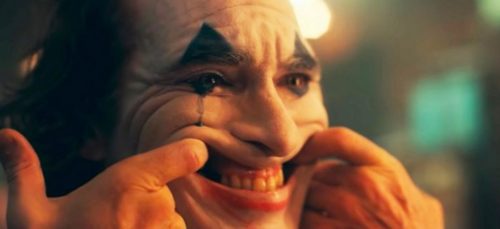
Nolan’s Batman trilogy has a grittiness to it, a realness to it, but it in no way forgets that it’s about comic book characters. Nothing in those movies is “real.” Imagine if you stripped away Batman’s comic book trappings. You’d no longer have an impossibly fit super-fighter genius-detective with untold money and unique future-tech taking on all the crime in a major city. Instead you’d be left with some version of Death Wish where the vigilante has a thing for bats.
So that’s what Joker is. It’s the story of Fleck, a troubled, psychologically damaged outcast who gets fired from his job and beat up and belittled, but in a purely low-key, realistic way, before shooting some guys on a subway while wearing clown make-up. Which gets him lots of press and lots of imitators and all of a sudden he’s inspired a movement of, it would seem, angry loners ostensibly mad at the rich.
Is that the Joker? No. It’s a guy in clown make-up. A not very bright guy. Which is all well and good if you want to tell that story, but if you do, you’d better have a reason for telling it. If you’re not telling a story having anything to do with the character of the Joker, which this movie isn’t, what story are you telling? And why? What mad passion is driving writer/director Todd Phillips to make this movie? It feels like a movie that was made to fit a concept, that was made because it could be made, and for no other reason than that.
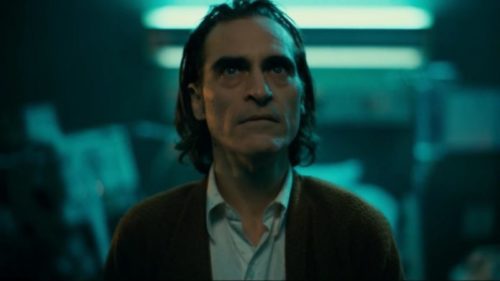
Joker toys with channeling rage against the rich, but its lead is supposed to be the epitome of evil. Are we meant to feel sympathetic towards him and his frustrations? If this movie were just about some guy, and not the Joker, then sure. You could be making that movie. But this one is an origin story of a super-villain. Except that actually it isn’t.
It’s all very muddled.
I have to wonder if Phillips wasn’t just as confused himself as to what he was making. One sequence is notable here. Late in the movie, post-murdering fame, Fleck is signed up to appear on his favorite talk show. He sits around rehearsing his performance, ending with his telling a knock-knock joke and mimicking shooting himself in the head. He does this a couple of times.
Appearing on the show, he half-heartedly reaches for his gun a few times, then tells his joke, and then—
Well, what? Shoots himself in the head? Of course not. This is an origin story of the Joker. He shoots the host in the head.
Why put this into the movie? It’s there because if this weren’t a story about a known super-comic-villain, that’s how you’d play it. It would be dramatic because your movie would be a creepy character study of a man losing his mind (like, for example, this brilliant movie). In which case he very well might shoot himself in the head. Who knows? Anything could happen. You could play the hell out of that scene in a movie about just some guy. You’d chew your damn nails off with the tension of it.
But if you’re making Joker, you’ve eliminated any tension this gambit could possibly create. It’s wasted space. It’s confused space.
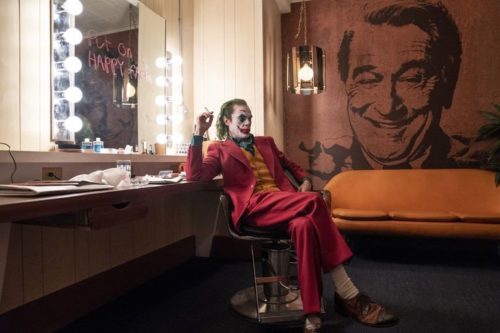
Another issue with the scene is that its supposed realism is so off-putting. A disturbed fuck-up shoots a TV host in the head. I don’t know if I can quite put my finger on it, but it doesn’t play well at all. It feels kind of cheap and exploitative. It’s telling that Phillips in this scene is referencing a scene in Frank Miller’s beloved Dark Knight Returns comic series from the ‘80s, in which the Joker, in over-the-top comics fashion, appears on a similar late night talk show and murders everyone in the audience with poison gas, along with killing the host and the other guests. Which is far more gruesome than shooting a man in the head, yet feels less disturbing for being so, let’s say, comical.
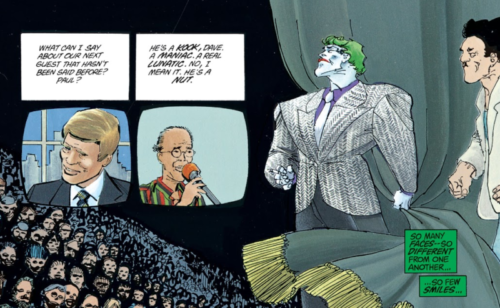
To harp on this scene even further, it’s here where Fleck voices whatever his philosophy is, which turns out to be generic and simplistic to the point of idiocy. Again, this is supposed to be super-villain the Joker?
And, again, no, it’s not. It’s just supposed to be some guy. Who, yes, happens to be the Joker, even though he isn’t, because listen, buddy, this isn’t some damn theme park ride superhero movie the likes of which Martin Scorsese thinks ain’t cinema, this is a goddamn ode to all things Scorsese!
I imagine someone saying.
I liked Phoenix in this movie. I liked the look, a little bit ’70s but without feeling desperate about it. Aside from that one lousy talk show scene, it’s not badly written. But I just can’t get over asking what the point of it is. It either has to be about the Joker or it has to be about us. It ends up being about neither.
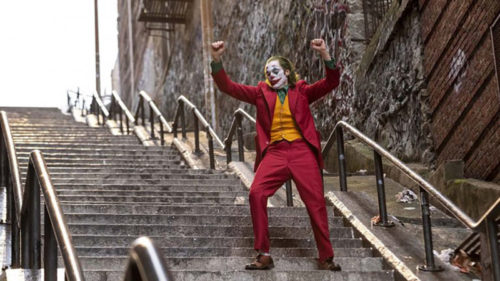

I very much agree. This was a well-made movie about a disturbed man becoming a killer, but not the Joker. There’s no sense that he’s some nascent mastermind. He doesn’t devise any nefarious plots of any kind. He just gets to like killing people. It’s a great performance, but I do not recognize the Joker anywhere here. Was there any reason this was made, except that they have to keep making Joker movies until the end of time?
It also really bothered me that they cast Robert DeNiro as a talk show host. That’s a very specific personality, and DeNiro is the opposite of funny. That’s why he worked so well and was so disturbing in the King of Comedy. Because he’s so naturally unfunny.
Why do they always fuck up television in the movies? It’s like they don’t know that we all watch television, and we know what it looks like. DeNiro would never have that show, and they would never put this weird guy on TV for having the worst stand-up set ever. Certainly not by giving him a stand-up set. And his interview would have cut to commercial in about three seconds. I didn’t buy any of that. Clearly they just wanted to remake the King of Comedy so so hard.
Ho hum. Two plus hours spent with a very uncomfortable person. Because why exactly?
Well then. If you didn’t like it, then I’m definitely not seeing it until it hits video.
Speaking of which, I watched Glass last night out of curiosity — it is neither interesting nor Lady in the Water bad enough to be entertaining. It’s like they don’t know we read comic books and think their silly references to “some other world” dropped into a vastly deranged version of normal life makes a lick of sense. Either make a comic book movie and accept it’s just entertainment or make a film about real life. Comic book characters don’t exist in real life and if they did, it wouldn’t be anything like Glass. Plus, Sarah Paulson is AWFUL as the least believable mental health professional of all time.